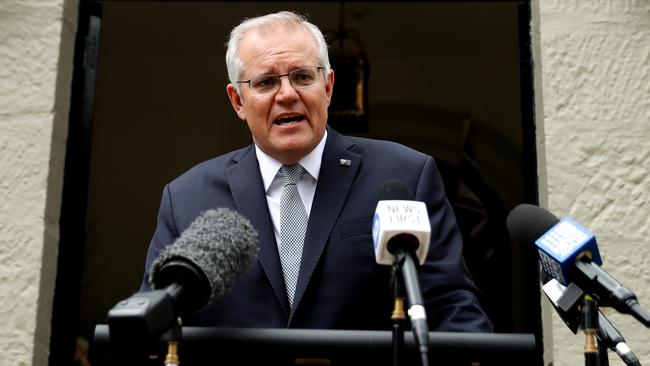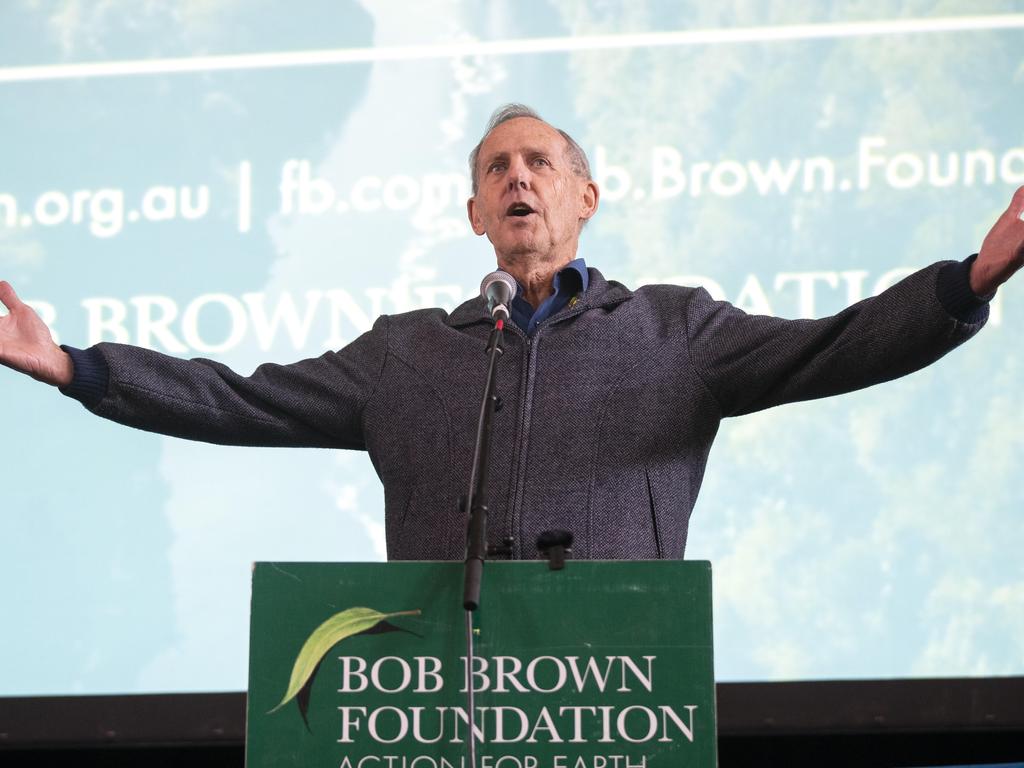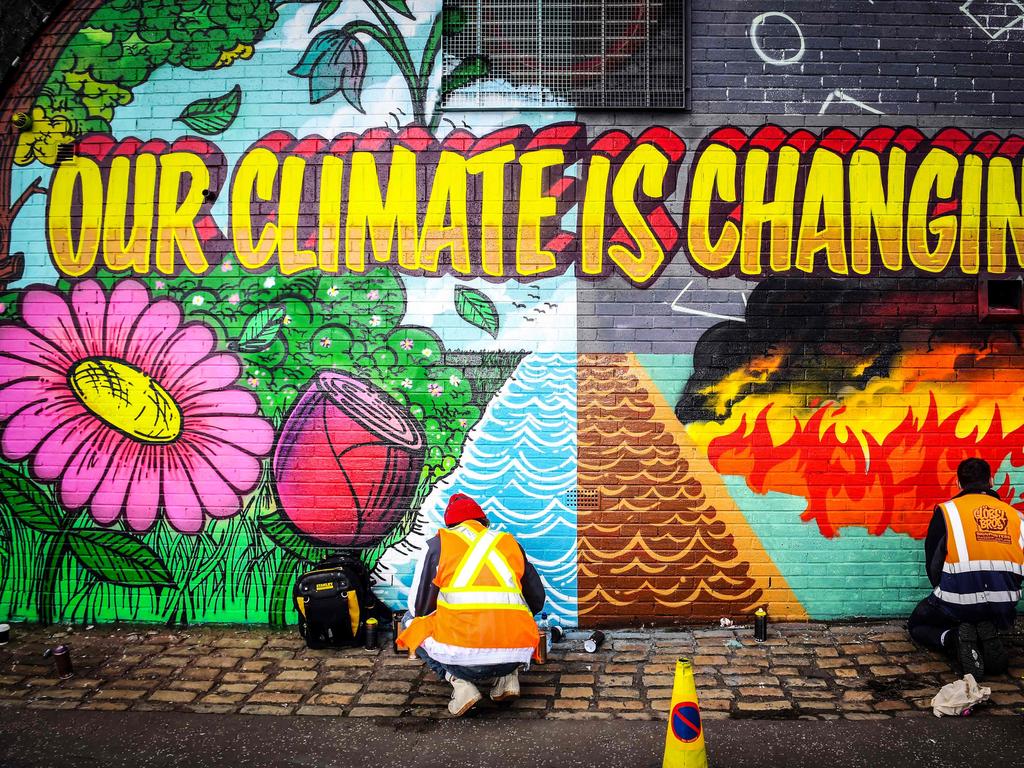Net-zero is a fiction which could be dangerous
Net-zero is essentially a fraudulent concept that can never be realised, but Scott Morrison has to say something to get through Glasgow.

Almost everyone, certainly this writer, accepts that climate change is real and the world needs to reduce greenhouse gas emissions. However, fantasy thinking doesn’t actually help.
If net-zero emissions by 2050 becomes a hard target for Australia, it will inevitably become quasi-legally binding. This will result in damaging, potentially catastrophic, short-term economic actions that won’t do anything much to help the planet, but will hurt Australia.
Australia owes a tremendous debt to the Nationals as the only political force of any consequence brave enough to force at least a modicum of serious debate around what has become a dangerously magic symbol. The whole debate in Australia, and several Western nations, is beset by the myth of false precision. This transforms a genuinely useful aspiration into an immediately enforceable quasi-legal commitment. This process is the enemy of rational policy.
Scott Morrison, representing a nation responsible for a tick over 1 per cent of global emissions and falling, is going to the great Glasgow confab. Xi Jinping, representing a nation responsible for a little under 30 per cent of global emissions and rising, and whose government has just accelerated production of coal, is not attending.
Morrison is under pressure, but whether he makes a formal declaration on net zero is completely meaningless for the planet. Xi is under no pressure, yet no single individual will have a greater influence on how much greenhouse gas is emitted in the next decade.
Let’s try and think from first principles. When Paul Keating argues that Chinese economic growth will remain high for many years, he often cites the huge urbanisation task ahead for China. Hundreds of millions of Chinese are yet to move from agriculture to towns and cities. The same is true in India, Indonesia and Africa.

Urbanisation creates carbon emissions as huge amounts of energy, concrete, steel, cement are needed, new industries arise, huge numbers of buildings go up. That cannot happen consistent with net-zero emissions. Chinese, Indians, Indonesians do not see the issue the same way as folks in Manhattan, Double Bay, Westminster or the Left Bank in Paris. The big news in India this week was the controversy over the shortage of coal. Not that they want to get rid of coal, but they don’t have enough coal on hand.
Similarly, Australia cannot ever really be net zero and keep our coal, iron ore, gas and meat industries, or ever recover manufacturing, or continue with the immigration program which is central to our economy and security. Just say one fine mythical day we did achieve miraculous net zero. The next year we would want to welcome 300,000 immigrants. Do we really think we could house, employ, feed and cherish them without adding one zot to our emissions?
Further, any scenario of net-zero emissions relies on technologies that do not yet exist, or do not work, or are completely unaffordable.
They may all come good, and it’s right that we invest massively in them. But the technology of the future often remains the technology of the future for many years. If they don’t arrive for a long time, you’ve still got to develop your economy and run your society in the meantime.
The Morrison government often boasts of how Australia has reduced emissions from 615 million tonnes in 2005 to 513 million tonnes in 2020. That’s a net reduction of 100 million tonnes. We got about 25 million of that in electricity, but the big contributor was land use, which yielded 100 million tonnes. Most of this was credits for not clearing land at a certain rate, and in some cases dedicating land to forest and vegetation so that it absorbed carbon. Most other sectors of the economy actually increased their emissions, which is what you’d expect in a growing society.
There is a limit to what land clearance practices can yield.
The Nationals have had an intelligent and unintimidated debate about all this. So I sought three views from National Party-formed minds. John Anderson does not now in any way speak for the Nats, but he is their most successful former deputy prime minister. He does not believe net zero is possible. He tells Inquirer: “I can’t see a pathway to global net zero – political or technical – at this stage. We may become cleaner and poorer while other countries become dirtier but richer and more powerful.
“Even as Glasgow approaches, we learn that Beijing has ordered its coalmines to up production by an estimated 98 million tonnes so as to keep industry going and the people warm during winter. If an authoritarian regime has to respond to political pressure when energy becomes expensive, jobs are at risk, or people are feeling the cold, what makes the democracies think they’ll be able to take their people with them if the price of bad planning starts to bite? Australian political leaders have got to be honest with the people about the real costs of these measures.”
Keith Pitt, the Nationals’ Minister for Resources and Northern Australia, tells Inquirer frankly that he has no idea what the cost of net zero would be for Australia.
But he says if we pursued net zero under current technology, which would involve things like abolishing the coal industry, then “$100bn wouldn’t even touch the sides”. That’s a colourful way for Pitt to say the cost to the economy would be vastly, vastly in excess of $100bn.
Of course, we’re not planning to do that as we hope technology will provide lots of solutions, or at least half-solutions.
“But,” says Pitt, “if you want to bank on future technological solutions involving hydrogen, batteries, wind, why not also bank on technological solutions involving gas and coal? Banking on technology we don’t currently have with hydrogen and batteries is fraught with danger and we should take a very cautious approach.”
Britain’s government, led by Boris Johnson, has been the super champion of maximally aggressive actions in moving to low-carbon energy. Much of the emissions reduction throughout Europe has simply involved transferring its industries to China, and this does the planet no good at all. But Britain has been especially evangelical about shifting to low-carbon energy.
The result is that the combination of a wind drought, and an economic recovery in Europe which has seen a rise in demand for gas and therefore gas shortages, means that energy prices have skyrocketed in Britain and working class Brits cannot afford to heat their homes. They sometimes face the choice of whether to heat or eat. Britain is facing a 1970s-style winter of discontent with forced factory closures and three-day working weeks, both a real possibility because of the energy crisis constructed out of too many renewables and not enough base load power.
Says Pitt: “Nothing focuses the mind of the voter more than losing power from their homes or food from their tables. I think Boris could well face the wrath of voters at the next election.”
The Nationals’ Matt Canavan, now on the backbench, was for three years the federal resources minister. He tells Inquirer net zero is like a beauty contest where everyone answers “world peace”.
“It sounds very nice but is just totally unattainable, given our need for fossil fuels to grow our food, travel and defend ourselves.”
He points out that Australia has met its targets whereas many other countries have not. Canada and New Zealand, to take just two, have shown no real movement in their emissions.
Says Canavan: “A formal embrace of net zero will give licence to every bureaucrat in Canberra to stop us doing anything. We won’t build another Adani, baseload power station, or even another Murray-Darling. All such projects will need to offset their emissions, which will just act as a big tax on developing our nation.”
It’s important to emphasise that no significant political movement, certainly not the Nats, is denying climate change or the need to reduce our emissions, find better and less-pollutive technology and clean up the environment. But there are three critical questions: What is the cost of specific measures? What really benefits the planet? And what measures are simply unrealistic?
There is a lot of talk about the cost of doing nothing more than we are doing. But this cost is entirely political. It is only indirectly financial, if some other nations or institutions take punitive actions against us. The International Energy Agency’s World Energy Outlook, published a few days ago, written to encourage maximum action on climate change, makes it absolutely clear that under what it calls the Announced Pledges Scenario, and also under the Stated Policies Scenario, demand for Australian coal is very strong for decades to come.
Demand for our coal declines radically only if the whole world embraces net zero, and as we have seen there is net-zero chance of that happening. But even under net zero, demand for our coal remains substantial.
Then there is the question of what actually benefits the planet. Australian coal is the cleanest in the world. If it displaces Chinese or Indonesian coal, it results in fewer greenhouse gas emissions, although extracting it results in more emissions on our national balance sheet. So you’d be nuts to close our coal industry.
The same is true of gas. Regional economies use Australian gas to substitute for their own coal. Shutting down our gas industry, while crippling for the Australian economy, would result in increased global emissions, and the fraudulent achievement of lower Australian emissions.
The politics of all this is diabolical for Morrison. At the last election he said Bill Shorten’s proposal for a 45 per cent reduction by 2030 would cost Australia more than $440bn and more than 300,000 jobs. Energy Minister Angus Taylor called it a “wrecking ball”.
What has changed? Nothing but the politics. But the international politics of all this could change in a minute, with a bad European winter or the Democrats losing congress in the US. Kevin Rudd destroyed his prime ministership when, having labelled climate change the greatest moral challenge of our time, he then abandoned his carbon trading scheme and declined to fight an election over it.
The Liberals have for 10 years been telling people radical action to pursue huge cuts in emissions would wreck the economy.
They’ve won election after election on that basis. Now they’re telling the electorate the opposite.
Morrison has to say something to get through Glasgow. But the Coalition will almost certainly bleed core votes on its right as a result. It might turn out to be something less than net zero.







Net-zero emissions is essentially a fraudulent concept that can never be realised in the real world. At its most benign, it works as a rallying cry for greater reductions in greenhouse gas emissions and further efforts to clean up the environment.